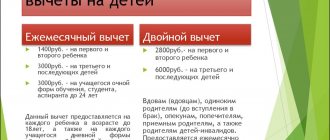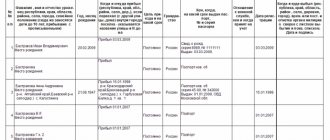Benefits for divorced mothers
Belonging to the group of single mothers
- The offspring was not born in wedlock and paternity has not been established. In such a situation, there may be two different entries in the “father” column on the child’s certificate:
- a dash indicating that there is no information about the pope;
- Full name when information about the applicant is not confirmed. In this case, the registry office even issues a certificate stating that the entry about the parent was made from the words of the mother.
- Note! A woman must submit Certificate Form No. 25 everywhere with a child’s certificate to confirm her status as a single mother.
- The child was born when the official marriage was registered, but the paternity of the applicant was disputed, and the identity of the other father as a minor was not established.
- A minor citizen is raised in a family of two people: a mother and a stepfather.
Is Putin’s payment necessary for the child’s father’s income if not married?
- The woman (mother of the child) has Russian citizenship;
- A child raised in marriage with a foreigner received Russian citizenship on the same basis as his mother;
- If a foreign husband works on the territory of the Russian Federation, then the woman must provide a certificate stating that child benefits were not accrued to the spouse (since he is subject to the Labor Code of the Russian Federation);
Disputes whose rights take priority - for example, a wife or mother - are doomed to failure, since in each specific case there may be significant circumstances relating to the personal relationship of the deceased with these persons, and which can influence the decision of the person making the payment. We draw your attention to the following fact. According to paragraph 1 of Article 1183 of the Civil Code of the Russian Federation, the right to receive wages and equivalent payments, pensions, scholarships, social insurance benefits, compensation for harm caused to life or health, that were payable to the testator, but were not received by him during his lifetime for any reason, alimony and other sums of money provided to a citizen as a means of subsistence belong to the members of his family who lived together with the deceased, as well as his disabled dependents, regardless of whether they lived together with the deceased or did not live.
We recommend reading: Cost of hot water in Tver 2019
What payments are due in case of divorce?
Required documents To obtain status you must provide the following package of documents:
- birth certificate of the baby, issued by the state registry office based on an extract from the maternity hospital;
- a certificate in Form 25, issued by the same authority, can be issued at any time;
- a certificate confirming cohabitation is issued by the housing department or BTI;
- a certificate specifying the family income is issued at the place of employment;
- a copy of the work book certified by the employer.
This is important to know: Is financial assistance considered income?
A sample certificate of Form 25 is here, a sample certificate of income 2-NDFL is here. Benefits and allowances All single mothers are entitled to receive federal and labor cash payments. They also have the right to receive monetary compensation in connection with pregnancy.
What payments are due to pregnant women by law?
When a woman is preparing to become a mother, she urgently needs not only moral, but also material support, since in Russia raising and raising a child is very expensive. The state helps pregnant women, and you can count on receiving appropriate payments. Which ones? We'll talk about this right now.
We recommend reading: how to return a modem
So, as part of the implementation of a national project to improve the demographic situation in Russia, some reforms were carried out, which, in particular, affected the issues of payments for pregnant women.
Divorced from my husband and have a child, what are the benefits?
If a woman has the status of a single mother, then she confirms this with a certificate from the civil registration or social protection authorities, where she is registered. A divorced woman has nothing to do with the status of a single mother. Her child’s birth certificate records the father, who is responsible for the financial support of the child under 18 years of age to the extent indicated to him by the state.
A divorced woman can acquire the status of a single mother in the event that the father of her child is deprived of parental rights after the divorce, about which appropriate records will be made. Divorced women who gave birth to children within 300 days after the divorce do not fall under the category of single mothers. Their ex-husband is listed as the child's father, but has the right to challenge paternity in court. Widows whose children receive a pension due to the loss of a breadwinner do not fall under this definition.
Divorce statistics today are quite high. The number of women raising children without paternal support is constantly growing; today about 30% of families are considered single-parent. In this situation, single women are often interested in what benefits and allowances mothers are entitled to after a divorce. If everything is clear with children that the father is obliged to pay them alimony until they reach adulthood, then the woman herself has to take care of her well-being.
Before you understand what benefits are intended for divorced mothers, you need to determine the woman’s social status. After all, a single mother has slightly different preferences than a mother supporting a child who has a father. Let's look at these concepts in more detail.
How is income taken into account if spouses are divorced to receive Putin's benefits?
At its core, the main target audience of the new monthly payment is young families, who most often have low incomes or are still in school. The low incomes of young people just starting their working careers often hinder their decision to have their first child, which is why many parents have their first child in adulthood. However, in fact, the law does not establish any age restrictions for parents - that is, it does not matter at what age the parents have their first child.
The procedure for processing new payments and the list of documents is regulated by Order of the Ministry of Labor dated December 29, 2020 No. 889n. According to this document, the mother of a child born no earlier than January 1, 2020 has the right to apply for benefits. If the mother has died or been deprived of parental rights, the father or guardian of the child can apply. The child and the person applying for benefits must have Russian citizenship. The average per capita family income should not exceed 1.5 times the subsistence minimum established for the working population in the region of residence.
What benefits are there if I'm divorced?
In the child’s certificate, in the “father” column there is a blank; the father does not take part in the child’s life at all and does not help him financially.
- Single-parent family is the status that a family receives when the father leaves the family. In reality, children have both parents. Divorce is a situation in which former spouses are forced to live separately. Most often, the mother remains with the young children; it turns out that the children are actually raised in an incomplete family without a father.
At the same time, the father exists in principle; he has every right to communicate with the child and must help him financially.
- Divorced women do not always understand why they are denied help as a single mother. This is a special status that requires documentary confirmation. It is worth clearly realizing that if mothers themselves raise their offspring after a divorce from their husband, then they can only classify themselves as single-parent families.
The state provides such women with guarantees, benefits and financial assistance. Mothers with this status can register with the district administration and receive a special certificate for a mother of many children. This helps streamline the provision of targeted assistance to them. Children of mothers with many children have the right to free travel on public transport. Families have the right to benefits in paying for housing and communal services. Children are provided with school uniforms and free meals.
They are admitted primarily to preschool institutions. They can visit exhibitions and museums for free. Mothers with 3 children receive a 30% discount on utility bills. If a woman has from 4 to 6 children, then the discount will be 50%, and with 7 children or more, the mother will not be charged for utilities.
Mothers of many children receive a 50% discount on telephone payments.
Peculiarities of paying state duty upon divorce of spouses
The pension is paid:
- child, sister, brother and grandson of the deceased under 18 years of age;
- the child, sister, brother and grandson of the breadwinner under 23 years of age, if they are full-time students at an educational institution;
- for life if the recipient is assigned the “disabled” category, which he received before the age of 18;
- until the brother, sister, child or grandchild of the breadwinner, whom the pension recipients are caring for, turns 14 years old;
- spouses, parents, grandparents (from 60 years old for women, from 65 years old for men, with some exceptions when the pension is assigned 5 years earlier) for life.
The pension will stop being paid if:
- the child, sister, brother and grandson of the breadwinner will turn 18 or 23 years old if they are a full-time student at an educational institution;
- the recipient will not be extended the status of “disabled person” received before the age of 18;
- the brother, sister, child or grandchild of the breadwinner, who is being cared for by pension recipients, turns 14 years old;
- the widow of a military man who served under a contract and died due to a military injury will get married;
- recipients will officially get a job. The exception is relatives of military personnel who served as conscripts as soldiers, sailors, sergeants and foremen. Such relatives are allowed to work and receive a pension at the same time.
The size of the social survivor pension for children in 2019 is:
- 5180 rubles if one parent died;
- 10,360 rubles if both died.
For family members of fallen military personnel, the pension is 5,180 rubles.
The insurance pension from January 1, 2020 is equal to 2,667 rubles for a dependent who has lost 1 breadwinner. And the amount of 5334 rubles will be received by children who have lost both parents.
The state pension in the event of the death of a serviceman or through the Ministry of Internal Affairs is 7,770 rubles or 10,360 rubles, depending on whether he was in service at the time of death or not.
From April 1, 2020, planned indexation of social, state and Ministry of Internal Affairs pensions for the loss of a breadwinner is expected.
The insurance pension is assigned to the relatives of the breadwinner if they were dependent on him and are disabled, because:
- have a disability;
- have not reached 18 years of age;
- are full-time students but have not reached 23 years of age;
- are caring for a child, sister, brother, or grandson of a deceased breadwinner who is under 14 years of age;
- reached the age: women - 60, men - 65 years.
The presence of dependent relatives caring for the child, sister, brother, or grandson of the deceased who are under 14 years of age is an optional condition for receiving a pension.
The fact of dependency for minor children of the breadwinner does not need to be confirmed. All other relatives must provide a certificate that they were dependent on the deceased, or prove the fact of dependence in court.
As soon as the breadwinner has passed away, apply for a pension; it will begin to be paid from the day the application is submitted.
If you wrote an application for retirement after death:
- less than 12 months, then they will pay for the previous months;
- more than 12 months, benefits will be paid only for the previous 12 months, regardless of how much time has passed since the death of the breadwinner.
As soon as the relative receiving the pension becomes able to work, for example, he turns 18, payments stop.
If the pension is assigned to relatives before retirement age, or if the disability is issued for life, then the payments will be indefinite.
An insurance pension will not be assigned to a relative who has committed a crime against the breadwinner, as a result of which the latter died. In such cases, such a relative will be assigned social assistance.
The pension is paid to the child, sister, brother and grandson of the breadwinner:
- until they turn 18 years old;
- until they turn 23 years old if they are full-time students at an educational institution;
- all their lives, as long as there is a “disabled” category, and they received it before the age of 18;
- until the brother, sister, child or grandchild of the breadwinner for whom they are caring is 14 years old. Pension recipients themselves must be over 18.
The parents and spouse of the deceased are paid:
- as long as they have the status of “disabled”;
- until the brother, sister, child or grandchild of the breadwinner for whom they are caring is 14 years old;
- if they reach the age of 60 for women and 65 for men.
The breadwinner is paid to the grandparents if:
- have the status of “disabled”;
- reached retirement age: 60 years old - grandmother and 65 years old - grandfather.
To receive a pension, the breadwinner's grandparents must not have able-bodied children, and the brother, sister and grandchildren must not have able-bodied parents who are required by law to support them.
The pension will be paid:
- adoptive parents, as well as parents;
- adopted children, as well as relatives;
- stepfather and stepmother, as well as natural parents, if they raised the child for more than 5 years;
- stepson and stepdaughter, as well as my own children.
If a child receives a survivor's pension and is adopted, they will still continue to receive benefits.
The spouse can remarry or get married, and if the pension was paid, it will continue to be paid.
Is a divorced woman considered a single mother?
A divorced woman cannot be given the status of a single mother, since the child has both parents, which is certified in the child’s birth document.
Note!
It is impossible to classify mothers who have a baby 300 days after a divorce or death of their husband as single. In this case, the husband or ex-husband is registered as the father in the registry office, even if he is not the biological father.
If a teenager's father is deprived of parental rights, then the mother also cannot be classified as a single mother.
A woman is also deprived of this status if the father of the baby is determined by court or voluntarily.
Who is considered a single mother?
Officially, a single mother is considered an unmarried woman who is dependent on a child, and the child’s parent cannot be determined. Including if the issue of paternity was not resolved either by filing an application with the registry office or in court.
A single mother can be classified as a woman who gave birth to a baby while married, but during this period or after 300 days after the divorce, the court made a decision that the current or former husband is not the father of the newborn.
An unmarried woman who adopts a child is also considered single.
Note!
The basis for assigning the status of a single mother can be the child’s birth certificate, where the father is recorded according to the mother’s words. The registry office confirms this fact with a certificate of form No. 25.
This is important to know: Payment in the early stages (up to 12 weeks) of pregnancy in 2020: amount
Woman with child in single-parent family
Raising a child in a single-parent family falls on the shoulders of one of the parents. From a legal point of view, the following cases can be classified as an incomplete family:
- A child is born in marriage, but the father and mother decide to separate and do not raise their son or daughter together.
- The father is recognized as missing or incompetent, dead or deprived of parental rights.
- The baby is born outside of marriage, paternity is established later, but the father does not want to take part in the upbringing.
- The child is illegitimate, adopted by another man who leaves the family and stops supporting the baby.
Only by the presence of a father in a child can one determine what status a single woman with children belongs to.
Payments for the first child in 2020
The benefit is paid to a pregnant woman if she registers with the local antenatal clinic no later than the 12th week of pregnancy.
Cash assistance in connection with childbirth is accrued regardless of what time the mother became registered. 70 days before birth + 70 days after birth = 140 calendar days (in case of complicated childbirth, another 16 days are added (156 days); if two or three children were born, then another 54 calendar days (194 days) are added to 140 days.
The one-time allowance for a child, regardless of his age, in 2020 is 15,382.17 rubles (in 2015 it was 14,497.8 rubles).
How is child support paid after divorce?
A woman, having divorced, continues to raise a minor child. In this case, the father of the teenager is obliged to pay part of his income - alimony - for his maintenance.
Alimony may be paid:
Alimony is calculated depending on the form of payment:
- A percentage of all types of profit is deducted: 25% for 1 child, 33% for 2 children, 50% for 3 or more.
- A fixed payment is paid. This method is used if there is no permanent job, part of the salary is paid in foreign currency, and earnings are below the minimum.
- Alimony is not in money, but in property. A deed of gift is drawn up for a car or apartment, clothes, shoes and other necessary things are regularly purchased.
Amount and methods of transferring payments
If the ex-husband intends to voluntarily pay alimony under a written agreement, it is recommended that the amount in which this will be paid (including the method) be detailed in the agreement.
During the forced collection of alimony through a government agency, the court itself determines the method and amount of deductions, paying attention to several factors.
Basically, their value depends on:
- the subsistence minimum, which has its own size in each subject (if it is not determined in a particular region, the minimum applied at the level of the entire country is used);
- a fixed sum of money indicated by the mother in the statement of claim.
Expert opinion
Maria Lokshina
Family law expert since 2010
When concluding an alimony agreement, you can agree that money will be received from your ex-husband on a specific date and in a certain amount, for example, to a bank card (or transferred in cash). In this case, there will be no special problems with regularity.
As for the official award of payments, in order to receive the money the plaintiff will have to contact the bailiffs with a writ of execution.
After the initiation of proceedings and the implementation of measures to determine the sources of income of the defendant, alimony will be received according to the details specified in the application and in the amount determined by a judicial act (if the debtor’s funds are sufficient).
The alimony agreement is also an executive document. If a man fails to fulfill his obligations under it, the woman has the right to submit it to the FSSP department for forced collection.
State guarantees for mothers after divorce
The state does not provide additional financial support for a child left without a father.
Note!
But if a single mother moves to a different social position, then she can apply for the following types of benefits:
- Like a low-income family. The monthly income per family member is less than the established minimum for living expenses.
- Like a large family with three or more dependent children.
This is documented. The amount of payments depends on the established minimum cost of living, on the number of dependent children, as well as on their health status.
Payments and child benefits during divorce
A woman, regardless of social status, has the right to child benefits. Types of benefits:
- In connection with pregnancy and childbirth. Only a mother with an official job or registered as unemployed can apply for this type of benefit. Payment - 100% of average earnings for the entire vacation period.
- Monthly allowance for caring for a baby up to 1.5 years old. Amount - 40% of salary. A non-working caregiver receives 3,249.17 rubles. for 1 child and 6498.33 rubles. for 2 or more.
- Compensation payments for child care up to 3 years old. They are paid monthly and amount to 50 rubles.
- For a child upon reaching 16 years of age or 18 years of age. The minor is required to attend school. The payment in each region of the country is set independently. It can be several hundred rubles or several thousand.
To apply for benefits, the applicant applies to the place of work or to the regional social protection authority.
Note!
The amount of accruals depends on factors such as whether the mother works or not and the region of her residence.
General benefits for mothers raising a child without the help of the father
In addition to benefits that apply only to single mothers, there are benefits that can be used by any mother raising a child on her own.
- a mother who is dependent on a child under 14 years of age is not subject to dismissal;
- during the reorganization or liquidation of an enterprise, the mother who is dependent on a minor child must be employed. Until employment, she retains the average salary for 90 days;
- sick leave payments of any duration, issued to care for a sick child of preschool age or sick leave payments for 15 days to care for a child from 7 to 15 years old;
- the ability to work part-time, change the work schedule. To do this, the woman submits a written application to her place of work;
- night, overtime shifts and business trips - optional;
- 14 days of additional leave. Only if there is such a condition in the employment contract;
- four days off in addition if the child being raised has a disability.
Housing benefits are a subsidy for the purchase of new housing in order to improve it:
- is issued to a parent under 35 years of age who is covered by the “Young Family” program;
- families whose living conditions need to be improved and this is established at the municipal level;
- the housing standard for all family members is less than established by law.
Additional benefits for single mothers
There are a number of benefits that are not established by federal laws, but are accepted by the constituent entities of the Federation. These include:
- registration of a child in a preschool institution out of turn. Does not apply to private institutions;
- payment for kindergarten is 50%;
- free use of textbooks. Depends on the school charter and the director of the educational institution;
- provision of two free meals a day;
- when visiting sections, the payment is set at a lower amount;
- free or partial payment referral to a sanatorium or camp;
- 50% reduction in the price of established medications;
- free massage treatments for the baby;
- income tax refund. Applies to every child under 18 years of age and to a full-time student up to 24 years of age. The refund amount is 2800 rubles;
- distribution of dairy products for infants up to 1.5 years old. In a number of regions, this form of benefit is replaced by monetary compensation;
- providing free clothes for the baby.
This is important to know: A regional coefficient is calculated for financial assistance.
You can find out more about the availability of benefits in the region by contacting the social protection authorities at your place of residence.
How I received Putin's child benefits
On January 1, 2020, the law on monthly payments to families with children came into force. Using it, you can receive a payment every month for the birth of your first or second child. This is not maternity or child care benefits, but an additional measure of support.
Calculate the average per capita family income. When calculating, it is necessary to take into account all family income before taxes for the last 12 months. This could be maternity benefits, salary, benefits, pension, income from renting out an apartment, interest on bank deposits, scholarships or business profits.
Are there benefits and cash payments for divorced mothers?
Currently, the state does not establish any specific benefits or cash payments for single-parent families. To receive special privileges, a social unit must formalize the status of “low income” or “large family” (if there are three or more children in the family).
If the divorce of the spouses occurred while the woman was pregnant or during the period when the baby was under one and a half years old, she has the right to standard cash payments, along with other mothers. This:
- maternity benefits;
- assistance at the birth of a child in the form of a paid sum, a one-time order;
- regular monthly allowance until the child turns 1.5 years old;
- monthly compensation payment until the child reaches 3 years of age;
- cash benefit paid to a child until he reaches 16 and 18 years of age (established in certain regions, subject to certain conditions);
- maternity capital for the birth of a second child (paid once).
Putin's allowance for a second child in 2020
- If you apply before the second child is six months old , payments will be assigned from the date of birth (the amount of unreceived payments for the months preceding the month of application will be transferred in full).
- If the application was made later than 6 months , the benefit will be assigned from the date of application.
To find out whether a family has the right to receive payments from maternity capital, it is necessary to calculate the monthly average per capita income for the 12 months preceding the month of application. To do this, all family income received in cash during this time is added up and then divided by 12 and the number of all family members.
In what cases is a woman entitled to financial assistance after divorce?
Not a single legislative act specifies a category of women called “divorced mother with children.”
Therefore, if only this circumstance exists, she cannot count on benefits. It is necessary to additionally obtain a status that gives the right to certain privileges.
For example, in the absence of an adequate level of material support, a woman has the right to apply to the competent authorities to register the poverty of her family.
In our country, all sections of society that have the status of low-income people have the right to apply for several types of assistance. They relate to various discounts and compensations, receipt of essential material goods, cash benefits (for a child, during marriage or in case of divorce), assistance in obtaining housing, etc.
Single mother or single-parent family?
Mothers raising children on their own can be formally divided into two groups:
Divorced women do not always understand why they are denied help as a single mother. They need to understand that the second group is a special status that requires documentary confirmation. We remember that if mothers themselves raise their offspring after a divorce from their husband, then they can only classify themselves as single-parent families.
Let's look at the grounds that allow us to determine belonging to a particular status in 2020. So, from a legal point of view, a single mother is a status that is confirmed by the following signs:
An incomplete family is a unit of society where, if there are both parents, the child remains in the care of one of them, most often this is the mother. Applicants acquire the corresponding status in various life situations. Legal signs of an incomplete family:
- The minor was born in marriage, but: the father and mother divorced and left the family;
- the son's father died;
- the parent has disappeared and there has been no news of him for a long period of time;
- the father is deprived of parental rights.
- The child was not born in wedlock, but paternity was subsequently established and proven, and the parents do not live together.
- The child is adopted by his mother's new husband, but after a while he leaves the family and ceases to participate in the life of the adopted person.
What benefits are given to a mother who is raising a child alone after a divorce?
It is recommended to find out a specific list of benefits from your local social security authority.
For example, if a woman has officially received the status of a single mother, the state guarantees her several benefits and concessions. This:
- free sets of things for a baby;
- dairy products at state expense, for children under 1 and 2 years of age;
- medications that are required for a child under 3 years of age;
- not taking into account children under 1.5 years of age when determining the amount of utility bills for a family;
- priority during the enrollment of minors in preschool institutions;
- a discount of 30% or 50% when paying for the cost of kindergarten services, as well as a sports or music school;
- free meals in schools, 2 times a day;
- vouchers to children's camps and other health institutions.
What is common property between spouses?
When it comes to dividing family property, the first thing people think about is apartments and cars. Indeed, objects acquired through compensated transactions using common funds during marriage will belong to both. The exception is things received before marriage and during its validity under gratuitous transactions. The latter include contracts of gift, loans, and receipt of property by inheritance.
However, family law includes not only things as joint property for spouses. Marital property includes the income of the husband and wife from labor and business activities. Moreover, any income belongs to both of them even in the case when one of them does not work, but is engaged in housekeeping and raising children. A family lawyer will help you determine the correct status of your existing property.
Pensions received by spouses, various benefits and payments are also included in the general category. However, in order to be included in joint capital, they should not have a special purpose. Targeted payments mean, for example, amounts to compensate for damage caused to the health of a particular spouse. This also includes compensation for moral damage and benefits for combatants.
What to do after a divorce and how to start living?
Yes, now you are in so much pain that you could climb the wall. But try to pull yourself together and listen to the following recommendations:
- Don’t blame your ex-spouse for all your troubles. At least two people are involved in the conflict, which means that both of them are responsible for the situation that has arisen. When you mentally let go of your ex-husband, the divorce will become easier;
- keep a positive attitude. Life is beautiful and amazing, it will give you more than one reason to be happy!
- take time for yourself. This rare opportunity has finally arrived;
- remember a sense of proportion. You shouldn’t throw yourself into your work, completely ignoring those around you, especially children. Find time for relaxation, walks in the fresh air, travel, new hobbies, etc.
Information! Don't forget: everything that doesn't kill us makes us stronger. Wise Nietzsche knew what he was talking about.
The condition of a woman after a divorce from her beloved husband
A woman experiencing a breakup as a result, for example, of her husband’s betrayal, experiences a whole range of emotions. This includes love, hatred, shame, bitterness and guilt, resentment and the desire for revenge. There is no more old life. The woman is afraid of loneliness, she is tormented by pangs of conscience. She wants to turn the situation back so that she can once again find herself in her unstable, but so painfully familiar world. But how difficult it is to painlessly survive betrayal, forget your husband after a divorce and not fall into depression.
Test: Am I a good mom?
1. Do you answer your child’s questions something like this: “It’s too early for you to know that”?
2. Do you condemn severity and strictness in raising children?
3. Are you friendly with your child's friends?
4. Do you allow help around the house (for example, cleaning), even if there is no or very little use from it?
5. Are you calm when you are angry with your child?
6. Does it happen that you soften the original decision, realizing that it is too harsh or unfair?
7. Are you trying to develop observation skills in your child?
8. Do you think it is harmful to involve a small child in adult life?
9. Do you apologize to your child if you were unfairly punished or deprived of pleasure?
10. Do you read books about education?
11. Are you happy about your child’s success? Do you praise him?
12. Do you scold your child if he is not fully fed?
13. After your order, is everything carried out unquestioningly?
14. Do you think that a child’s innocent lies are acceptable?
15. Do you think that pocket expenses should be given not a predetermined amount, but as much as the child asks?
16. Do you think that a child cannot have secrets and has no right to feel offended if, for example, you open a letter that the child received?
17. Can a child win an argument with you?
18. Do you explain the reason for banning this or that?
19. Do you think it is sometimes necessary to include drill in education?
20. Do you use sarcastic remarks towards your child?
21. Do you enjoy spending time with him?
22. Do you forget about your promises, especially those that for a child are a reward for something difficult?
23. Do you give your child independence in a new activity?
24. Do you consider the fact that when you were his age, you didn’t do this and weren’t interested in it, to be a sufficient reason for condemnation?
25. Do you know better what a child needs?
26. Do you think that children can have their own secrets?
27. Can you tear yourself away from work or an interesting program if a child asks for advice or help?
Reasons for divorce
In the cold language of jurisprudence, divorce is viewed as just a dissolution of marriage. But behind the divorce stamp there are problems, conflicts, tears, resentments and a lot of negative and destructive things.
There can be several reasons for divorce:
- Alcohol abuse or drug use by one of the spouses.
- Inability to build your own life due to lack of your own housing.
- Inclusion of relatives of spouses (mother-in-law, mother-in-law and others) into the life of a young family.
- Inability to have children.
- Forced long-term separation of spouses.
- Imprisonment of one of the spouses.
- Serious long-term illness of one of the spouses.
- Treason.
- Irresponsible attitude towards family responsibilities of one of the spouses.
- Domestic violence.
- Constant conflicts.
Sometimes it happens that the reason for divorce is a total divergence of interests of a married couple, often mutually exclusive hobbies of the spouses, leading to protracted conflicts
The reason cannot be unimportant or frivolous. Behind each of them there are deep feelings and attempts to change something in the relationship.
And if you once admit the thought of divorce, then like a snowball it will become overgrown with arguments and ideas about another life until it ruins the existing relationship.
For every woman who has gone through a divorce process, there comes a “tomorrow outside of marriage.” What's there?










